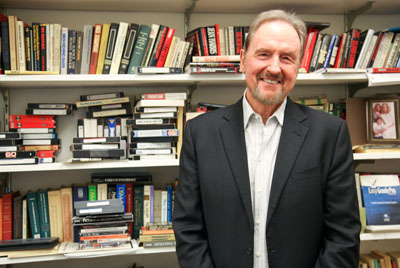No one has documented the long-term psychological damage of incarceration in the United States more than UC Santa Cruz psychology professor Craig Haney.
Haney, who holds psychology and law degrees, has spent his entire career watching prison populations grow while probing the psychology of imprisonment and the causes of violent crime. He has interviewed thousands of prisoners, many on death row or in solitary confinement in the nation’s growing stable of “supermax” prisons.
Haney has been selected to deliver the 49th annual Faculty Research Lecture scheduled for Tuesday, April 7, 2015, at 7 p.m. at the Music Recital Hall on the UC Santa Cruz campus. The lecture is free and open to the public. Doors open at 6:30 p.m. and a reception will immediately follow.
Haney's lecture is titled "PrisonWorld: How Mass Incarceration Transformed U.S. Prisons, Impacted Prisoners, and Changed American Society.” The faculty research lecturer is selected each year by UC Santa Cruz Academic Senate.
Since the "war on drugs" in the early 1970s, U.S. prison numbers grew to account for 25 percent of all the world's prisoners even though the nation amounts to only 5 percent of the world's population. Haney has witnessed firsthand the profound transformation that has taken place in the American prison system, during a period that has been termed the “era of mass incarceration.” Since the publication of his 2006 book, Reforming Punishment, he has continued to document and assess conditions of confinement in many of the country’s harshest and most severe prisons.
During his lecture, Haney will illustrate and analyze his findings about the effects of the transformation of U.S. prison policies and conditions, including the rise of supermax prisons such as Pelican Bay in far northwestern California, and discuss the impact on prisoners most directly affected by it.
For decades, Haney, who joined UC Santa Cruz in 1977, has warned that surging prison populations and deteriorating conditions are a dangerous combination. “We need to remember that the overwhelming majority of prisoners will be released one day,” he says. “It should matter to all of us what state of mind they are in when they rejoin free society.”
In 1971, as a graduate student working with Philip Zimbardo at Stanford University, Haney took part in and documented the infamous Stanford Prison experiment that simulated incarceration with students randomly selected to be guards and prisoners.
Haney’s research hasn’t been limited to scholarly papers in obscure journals. Thursday, (March 26) Haney took part in the Bipartisan Summit on Criminal Justice Reform in Washington, D.C. joining advocates and analysts across the political spectrum to address the American criminal justice system and potential reforms.
Haney has testified before the U.S. Senate and the California Legislature. His testimony in a 1999 federal court case challenging the constitutionality of supermax conditions led to a landmark decision in Texas. Another landmark ruling, this time in California, ordered the state to drastically reduce its prison population. The United States Supreme Court cited Haney’s analysis and trial testimony in upholding the order.
He was named to a National Academy of Sciences panel of leading scholars and experts on corrections to study the causes and consequences of high rates of incarceration in the U.S. The panel’s report last year was a damning indictment of the growth of incarceration.
In recent years, policy makers have begun to take notice. In August 2013, reversing years of tough political rhetoric in Washington, U.S. Attorney General Eric Holder declared that levels of incarceration at federal, state and local levels had become both "ineffective and unsustainable.”
"We cannot simply prosecute or incarcerate our way to becoming a safer country," he said.
In January, New York City officials said they would eliminate the use of solitary confinement for all inmates age 21 and younger at the notorious Rikers Island prison.
Faculty research lecture features prison and incarceration expert Craig Haney
Psychology professor has documented the long-term psychological damage of incarceration in the United States



